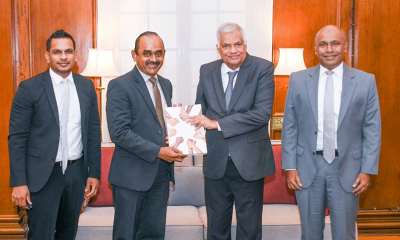Business
People’s Bank Buddhist Society donates new house to a needy family in Rambukkana

People’s Bank recently handed over a newly constructed house to a low income family in Kiriwallapitiya, Rambukkana as part of the celebrations of its 62nd anniversary, funded by its Buddhist Society and built with the support of the Sri Lanka Army.
The troops of 8th Battalion of Sri Lanka Sinha Regiment, under the 611 Infantry Brigade provided the construction manpower for the home. The recipient of the house, K. A. Nilmini Dilrukshi had lost her husband to a sudden road accident and had to support her three school-aged children.
The event was graced by the presence of Senior military officers including Major General D M K D B Pussella, Commander of Security Forces Headquarters (West), People’s Bank’s Deputy General Manager (Banking Support Services), Nipunika Wijayaratne, Kurunegala Regional Manager and President of the People’s Bank Buddhist Society, Rohan Perera, Kegalle Regional Manager, Lalani Adikari, Assistant Regional Managers and officer bearers of the Buddhist Society.
Business
New policy framework for stock market deposits seen as a boon for companies

The government’s new policy framework to allocate a maximum interest rate for stock market deposits would pave the way for companies and investors to plan their future business activities, a senior stockbroker said.
‘Accordingly, the Colombo Stock Exchange (CSE) has entered a period of strong revival, supported by economic stabilization and rising investor confidence while significant market reforms would support the new policy framework on interest, Assistant Vice President Softlogic Stockbrokers, Eardly Kern, told The Island Financial Review.
He said that the imposition of maximum interest rates for stock market deposits would prevent the interest rates from moving upwards, thus paving the way for investors to invest in stocks with a lot of confidence.
Kern added: ‘The CSE outlook would provide expanding opportunities for investors as Sri Lanka positions itself for market-led investor platforms.
‘Improving macro fundamentals, such as lower interest rates, rising corporate earnings and historically attractive valuations, have been key catalysts in driving investment into the equities market.
‘These tailwinds, together with ongoing economic reforms, have helped re-establish confidence among both local and foreign investors.
‘Over the past two years, the number of CDS accounts has surpassed 949,000, with digital on-boarding through the CSE mobile app driving the latest surge.
‘Further, foreign inflows for 2024 amounted to USD 66.5 million, while Rs 175 billion was raised through capital market activity, including 16 new listings. With a target of 20 IPOs on the horizon, the CSE anticipates several new companies entering the market by early 2026.
‘The All Share Price Index (ASPI) delivered an impressive 49.7 percent return in 2024, ranking the CSE as the second-best performing market in Asia for the year. By November 2025, the index had risen a further 45.65 percent amounting to an extraordinary two-year return of approximately 95 percent.
‘The S&P SL20 Index recorded a parallel recovery, gaining 58.5 percent in 2024 and 31.84 percent so far in 2025.
‘ Despite the rally, the CSE continues to trade below its 10-year average PER and valuations remain significantly more attractive than in regional markets, such as, India, Malaysia, Vietnam, and China.
‘ Turnover has surged to Rs 1.06 trillion in 2025 (as of mid-November), nearly doubling the figure recorded in 2024. Market capitalization grew 34 percent n 2024, despite only around 40,000 active investors capturing most of the gains—highlighting the potential for broader participation.
‘ Corporate earnings have also strengthened markedly. After generating Rs 686 billion in earnings during 2024—a 50% year-on-year increase—listed entities are projected to deliver between Rs 775–800 billion in 2025. Earnings for the first half of 2025 have already grown 57 percent year-on-year.’
By Hiran H Senewiratne
Business
Dialog reinforces commitment to heritage through Kelaniya Duruthu Festival

Dialog Axiata PLC, Sri Lanka’s #1 connectivity provider, has reinforced its enduring commitment to preserving national culture by sponsoring the Kelaniya Duruthu Festival, aligning long standing patronage with purposeful community engagement to honour religious heritage, support cultural continuity, and strengthen shared values.
The annual Kelaniya Duruthu Festival, one of Sri Lanka’s most significant religious and cultural observances, was held on 8th, 9th and 11th January 2026, marking a congregation of thousands of devotees and visitors at the historic Kelaniya Raja Maha Vihara. As a long-term patron, Dialog continues to provide sponsorship support, enabling the seamless organisation of the festival while uplifting traditions deeply rooted in the nation’s cultural identity.
Through its continued support of the Kelaniya Duruthu Festival, Dialog underscores its role as a responsible corporate citizen dedicated to safeguarding Sri Lanka’s cultural and religious heritage for future generations. This commitment is further reflected in Dialog’s long-term patronage of national events such as the Kandy Esala Perahara, Nawam Maha Perahara at Gangaramaya, Katharagama Esala Perahara and Gatabaru Esala Perahara. Complementing these efforts, Dialog has also undertaken heritage preservation initiatives including the construction of the vestibule at Dimbulagala Aranya Senasanaya, the launch of a website and directory of Amarapura Maha Nikaya Temples, and the restoration of the Anuradhapura Maha Vihara Sannipatha Shalawa.
Business
Sri Lanka launches its first-ever Smart Bus Ticketing System

A National Breakthrough in Public Transport Digitalization Powered by Ceylon Business Appliances with Nimbus Ventures.
Sri Lanka has taken a historic step forward with the launch of its first Smart Bus Ticketing System, enabling passengers to pay fares using contactless cards, digital wallets, and QR payments. This advancement places the country among global leaders in smart mobility.
The initiative was made possible through collaboration with the Government of Sri Lanka, leading banking partners, and the technology leadership of Ceylon Business Appliances (CBA) and Nimbus Ventures, who serve as the Technology, Software, Hardware, and Operational Partners behind the nation’s first Open Loop Transit Payment System.
For decades, CBA has been at the forefront of Sri Lanka’s digital transformation efforts—bringing modern, global-standard technologies that have strengthened the nation’s digital infrastructure.
Speaking to the media at the launch, Sardha Fernando, Managing Director of CBA, stated:
“This is not just a ticketing upgrade—it is a complete digital evolution of public transport in Sri Lanka. For years, CBA has been committed to introducing advanced technologies to the country, and today, we are proud to bring a globally recognized, secure, and seamless smart transit solution to our people. With every tap, we are enabling convenience, transparency, and a more connected future for all Sri Lankans.”
He added:
“This milestone reflects our ongoing mission: to help build a digitally empowered Sri Lanka that is ready to embrace the technologies shaping the world.”
‘Ruwath Fernando, CEO/Director of CBA, highlighted:
“This project demonstrates that Sri Lanka is ready to adopt and operate on par with global smart mobility technologies. Our commitment has always been to bring the world’s best software systems and innovations into Sri Lanka—solutions that are secure, scalable, and built to international standards.”
He continued:
“By introducing a state-of-the-art open-loop transit payment platform, we are proving that Sri Lanka can not only embrace but also successfully operate advanced digital ecosystems. This is a defining moment in positioning the country as a technology-proof nation prepared to trial and adopt global digital advancements.”
CBA extends heartfelt congratulations to the banking partners who trusted this vision—
Sampath Bank, Commercial Bank, Bank of Ceylon, People’s Bank, and DFCC Bank— on the successful launch of their new ticketing application.
This application integrates seamlessly with the PAX A910S ticketing device, powered by a robust CBA– Nimbus ventures software solution, engineered for scale, reliability, and national deployment..
-

 Business4 days ago
Business4 days agoDialog and UnionPay International Join Forces to Elevate Sri Lanka’s Digital Payment Landscape
-

 News4 days ago
News4 days agoSajith: Ashoka Chakra replaces Dharmachakra in Buddhism textbook
-

 Features4 days ago
Features4 days agoThe Paradox of Trump Power: Contested Authoritarian at Home, Uncontested Bully Abroad
-

 Features4 days ago
Features4 days agoSubject:Whatever happened to (my) three million dollars?
-

 News4 days ago
News4 days agoLevel I landslide early warnings issued to the Districts of Badulla, Kandy, Matale and Nuwara-Eliya extended
-

 Business23 hours ago
Business23 hours agoNew policy framework for stock market deposits seen as a boon for companies
-

 Opinion6 days ago
Opinion6 days agoThe minstrel monk and Rafiki, the old mandrill in The Lion King – II
-

 News4 days ago
News4 days ago65 withdrawn cases re-filed by Govt, PM tells Parliament

























